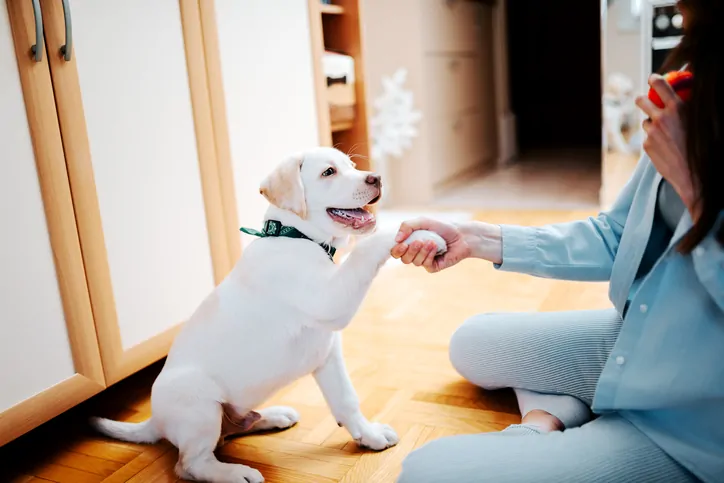To begin raising your puppy, you should schedule their first vet visit, puppy-proof your house, feed them high-quality food, train and socialize your puppy, and spay or neuter after they mature.
Your puppy will be examined, vaccinated, and tested for worms. Your vet will also instruct you in the care requirements for your puppy based upon their breed and condition.
Once your pup is 8 weeks old, you can begin teaching simple commands in 5-10 minute training sessions that include lots of positive reinforcement.
Puppies. They're so cute that simply saying "puppies" is enough to make most dog lovers smile. And they're irresistible. The instant you pick up a puppy, you feel compelled to take it home. Next thing you know, there's a barking, shedding, chewing bundle of fluff roaming all over your place. Whatever strange powers puppies may have over us, the enchantment begins to fade after you get them home, and the reality of raising a puppy sinks in.
You don't have to fall out of love with your puppy when the spell breaks, but, if you have the right tricks up your sleeve. Here, we will reveal some puppy-raising tips that work like magic.

The last thing you need is for your puppy to get sick soon after you bring them home. Puppies have underdeveloped immune systems and are vulnerable to illness and injury. While puppies are nursing, they receive protection from germs through antibodies in their mother's milk. Around six weeks of age, those antibodies start to wear off, and your puppy will need to be vaccinated to remain protected.
Additionally, puppies adopted from a shelter may be exposed to other dogs that carry viruses which could prove fatal to puppies. At your puppy's first veterinarian visit, ideally between 6 and 8 weeks old, they will be vaccinated against viruses that are common in shelters including:
In addition to vaccinations, your puppy's first vet visit will include a thorough examination. Your vet may also take a stool sample to check for intestinal parasites. At the first veterinary visit, you will receive information about your pup's breed-specific care requirements including exercise needs, dental care, reproductive health, nutrition, and vaccination schedule.
Your puppy will need to return to the veterinarian a few weeks later for additional vaccines that protect against the following:
Veterinarians can start heartworm prevention at eight weeks of age. Heartworm prevention is only effective on late-stage larvae so, most heart wormers must be given monthly. If you miss a dose or are more than two weeks late, your pup will need a blood test to check for adult heartworms. Heartworm disease can cause damage to your puppy's heart and lungs months before it can be detected by a blood test, causing long-lasting, life-altering effects. Most heartworm prevention also protects against intestinal worms, and some may even include flea prevention.
A puppy-proofed home may sound like a fairy story but it can be achieved with some strategic adjustments around the house. Start with setting your home up for puppy potty training. If you are crate training your pup, ready it before you bring them home with comfy blankets and a treat or toy to tempt them in. Introduce your pup to its crate by leaving the door open for them to explore on their own. Make sure your pup has room in its crate to stand up, lie down, and turn around. Other ways to puppy-proof your home include:
The best way to keep your puppy out of mischief is to make sure they are getting plenty of exercise and stimulation. If your pup is running around the house like a wild animal, it's a good time to take 10-15 minutes to play catch, go for a walk, or romp around in the yard with your furball.
At four to six weeks old, introduce your puppy to solid food by combining kibble with a milk replacer to make a gruel. This reduces gastrointestinal discomfort and helps them adjust to solid food. By eight weeks old your puppy should be ready for dry food.
The best puppy foods feature ingredients that are healthy sources of protein, calcium, and calories. Ensure your puppies dog food has GRAIN – this is vital for a healthy heart. Try to stay away from items that include high quantities of corn or meat by-products; meat should always be the first ingredient. Three to four feedings each day are best for puppies. Smaller meals digest more and balance puppy energy levels.
You should transition your puppy to adult food as they approach maturity because puppy food is particularly high in calories and nutritional supplements. Extended use of puppy food may cause obesity and orthopedic issues.
The most beneficial training you can give your puppy is socialization. A puppy must be socialized to enjoy interactions and feel at ease with other animals, people, locations, and activities.
Socializing should start when a puppy is between 3 and 14 weeks old. Begin socializing your puppy by encouraging friends and family to hold and pet your puppy. Once your pup is 16 weeks old and fully vaccinated, visiting the dog park can help them learn to get along with their peers. Taking your puppy to the groomers early and often will teach them to tolerate being handled.
You can start teaching your puppy simple commands such as come, sit, down, and stay at around 8 weeks of age in training sessions that last no longer than 5 to 10 minutes and always end on a positive note.
Spaying or neutering your pooch reduces the number of stray dogs that end up being euthanized. Small breed dogs are mature enough to spay or neuter at around 6 months of age, while larger breeds may not be mature enough until 16 to 18 months old. Nevertheless, scheduling your pup's spay or neuter as soon as they are mature enough makes the surgery easier for your veterinarian and helps your puppy recover faster.
Phone: (855) 461-8259
Email: [email protected]